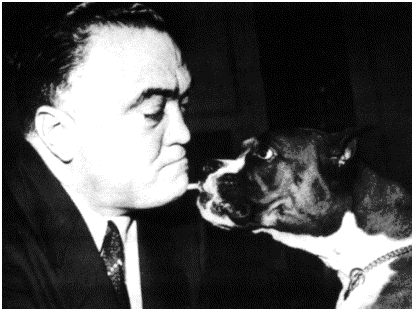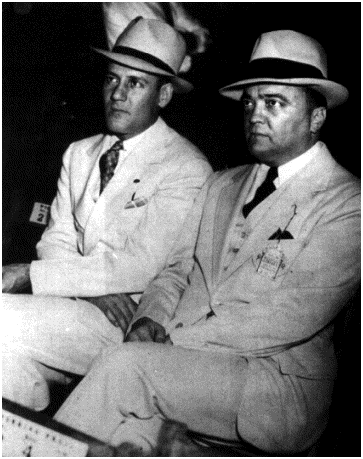FBI Hero Melvin Purvis's
War Against Crime, and
J. Edgar Hoover's War
Against Him
Alston Purvis
Alex Treniowski
(Public Affairs)

Purvis was gorgeous, well-built, a snappy dresser, liked fast cars. Hoover was often taken with handsome, debonair young men. Possible new agents were "paraded before the director," according to the author, in a not-so-subtle beauty line-up, so Hoover could reject the very homely and the very tall. He wanted his boys to be short so as to not to show him up as a mere 5' 9". Even thirty-five years later (according to John Erlichman, assistant to Richard Nixon) Hoover's desk at FBI headquarters was elevated so that all visitors did not, so to speak, loom large.
 Purvis was a darling of the 30s press. And the press was nuts about the drama of the killing of Dillinger, there in front of the Biograph Theatre, in Chicago, on July 22, 1934. After this stunt, according to Literary Digest magazine, Purvis was considered one of ten "outstanding personalities" of the year, along with Hitler, Mussolini, and Franklin D. Roosevelt.
Purvis was a darling of the 30s press. And the press was nuts about the drama of the killing of Dillinger, there in front of the Biograph Theatre, in Chicago, on July 22, 1934. After this stunt, according to Literary Digest magazine, Purvis was considered one of ten "outstanding personalities" of the year, along with Hitler, Mussolini, and Franklin D. Roosevelt.
J. Edgar Hoover was not on the list. And J. Edgar Hoover, according to Alston Purvis, didn't like that. Also, according to Alston Purvis, he certainly did not like the fact that Purvis was thought to be responsible for the apprehension (and deaths) not only of John Herbert Dillinger, but of Charles Arthur "Pretty Boy" Floyd and George "Baby Face" Nelson.
Purvis rose quickly, captured the public heart, was famous, but, by July of 1935, had been forced to resign from the FBI. And, for the rest of his life, according to the author, he was watched by FBI agents around the country so that the boss could actively intervene whenever there was a chance of a respectable job.
 Vendetta is at its best when it is putting us in the middle of the adventure of cornering and murdering the three hoodlums. It is less successful in the trials and tribulations of Melvin Purvis. His son is obsessed with the fact that his father was unjustly hounded from the FBI, underwent surveillance for many years, put himself through shock therapy, descended into alcoholism and addiction to morphine, and finally, in 1960, took his own life. Vendetta is his chance to place the blame squarely on Hoover's shoulders.
Vendetta is at its best when it is putting us in the middle of the adventure of cornering and murdering the three hoodlums. It is less successful in the trials and tribulations of Melvin Purvis. His son is obsessed with the fact that his father was unjustly hounded from the FBI, underwent surveillance for many years, put himself through shock therapy, descended into alcoholism and addiction to morphine, and finally, in 1960, took his own life. Vendetta is his chance to place the blame squarely on Hoover's shoulders.
Perhaps so. Hoover was no panty-waist, was a master of high and low vendettas, allowed no competition, gathered dirt on everyone --- including top Washington officials --- so that he always had an ace-in-the-hole, a form of job-security through implicit blackmail.
But Melvin Purvis brought his own baggage along with him. According to the oldest of saws, he who lies down with the dogs must certainly arise with fleas. Hoover was not anyone we would ever want to associate with, much less work for. One look at his bulldog eyes, we suspect, and no self-respecting lawyer (which Purvis was) --- much less the rest of us pups --- would want to be housed in his kennel.
In addition, one would want to know why, after his fall, and despite being ravaged by other FBI operatives for so many years, did Melvin Purvis keep a picture of Hoover in an honored place on his wall ... up to the day of his suicide. When he signed up with the FBI, he certainly knew that one of his jobs would be stakeouts, shootings, blood-letting, and dealing with dangerous operatives, both inside and outside the agency.
When one studies the early history of the FBI, one must conclude that Hoover was not all that much different from the person he appeared to loathe the most in the world, namely Josef Stalin. Soon after Hoover took over the "Bureau of Investigation," he began the process of the sovietization of an American national police force, giving it a structure not unlike the Russian equivalent of the Bureau of Investigation.
Like his mentor in Moscow, Hoover was narrow and suspicious, a schemer, a card-filer with enormous attention to detail, a man possessed of a profound memory --- especially of his hates (and, perhaps more dangerous, old loves turned to hates). The main difference between him and Stalin, we believe, was that Stalin did not tend to fall in love with his chosen disciples.
Thus, Purvis fell into Hoover's love-trap. And he was never forgiven for not knowing how to stay in the box without attracting others' --- namely journalists' --- fond affection.
It's a sad story, but those who join the army, sign up with the police, become card-carrying members of the Stasi, the NKVD or the FBI are not enrolling in the Powder Puff Derby. Their jobs mean killing or being murdered, with bombs, bullets or in-house back-stabbings.
Their superiors survive by being up-to-date versions of Mata Hari, Beria, Rasputin, or --- like Hoover --- Lady Macbeth. To expect honor and longevity with such a person is to be irrational; to be unfailingly loyal to one long after being so thoroughly screwed --- as Purvis was --- might well be considered deranged.